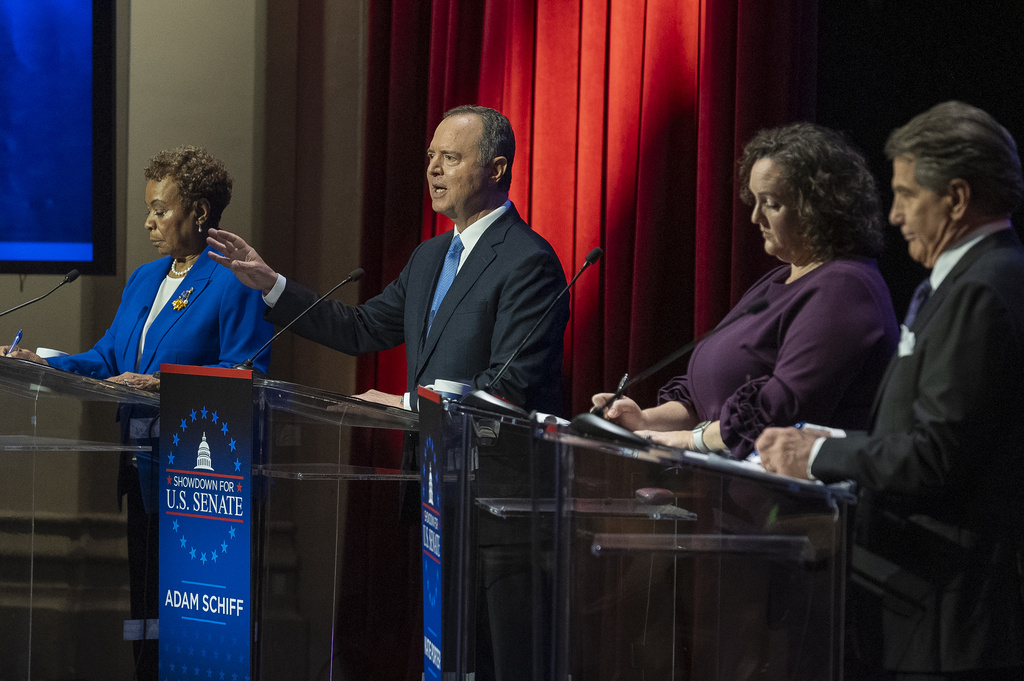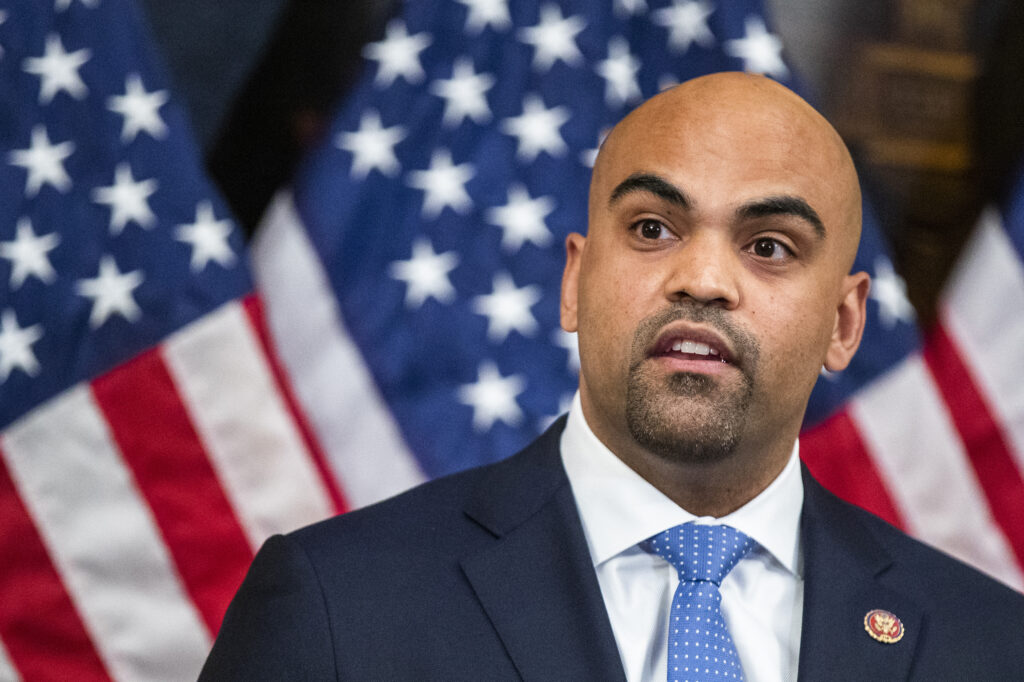
Voters across 16 states and one U.S. territory will cast their ballots on Super Tuesday, the largest primary date of the 2024 cycle. At stake are 854 delegates on the GOP side and 1,420 delegates on the Democratic side.
President Joe Biden is expected to cruise to victory as he faces no serious threat from any Democratic challenger, while former President Donald Trump is expected to vanquish former U.N. Ambassador Nikki Haley in most if not all states voting on Tuesday.
Yet neither Biden nor Trump will reach the threshold to become the presumptive nominees.
Other battles that will capture the attention of the Washington Beltway include high-profile Senate primary races in Texas and California, new congressional maps in two states, and the fallout over a controversial Alabama ruling over frozen embryos.
Here are the 10 things to watch out for on Super Tuesday.
ELECTION 2024: FOLLOW LATEST COVERAGE
Does Trump sweep all Super Tuesday states?

Trump has won all the nominating contests this primary season except for one, in Washington, D.C., where Haley won the capital’s 19 delegates. This was the former ambassador’s best chance at winning before Super Tuesday.
But Trump, who leads Haley by an average of more than 63 percentage points in national polling, could win every state voting on Tuesday. He is already likely to win in delegate-rich California.
The Golden State changed its delegate allocation last summer to one in which a candidate who gains 50% of the vote will win all 169 delegates, the most of any Super Tuesday state.
Texas, the state with the second-highest delegates, could award the majority of its 161 delegates to Trump if he wins a majority of the vote.
The former president is likely to win the majority of the vote in several states and therefore all of its delegates. Those states include Alabama, with 50 delegates; Arkansas, with 40 delegates; Maine, with 20 delegates; Massachusetts, with 40 delegates; Oklahoma, with 43 delegates; and Vermont, with 17 delegates.
The future of Nikki Haley’s campaign
After losing Iowa, New Hampshire, Nevada, the U.S. Virgin Islands, her home state of South Carolina, Haley, and Michigan, Haley declared she would still continue her primary race through Super Tuesday.
Yet, her path forward after Super Tuesday is murky at best. If Haley doesn’t win a single state, in conjunction with Trump dominating the delegate share, there is an even higher probability she could suspend her campaign.
The Trump campaign is already predicting the earliest they will reach the threshold to become the presumptive nominee is on March 12 and by March 19 at the latest.
Haley has remained coy about a post-Super Tuesday plan. Her campaign has not released any events past Tuesday, though many of her supporters said they would want to keep running.
No Labels, the centrist group, suggested they would be interested in a third-party unity ticket with Haley, but her campaign firmly rejected those overtures.
Biden’s uncommitted vote challenges

Biden’s biggest challenge on Tuesday isn’t another Democratic rival such as Marianne Williamson or Rep. Dean Phillips (D-MN) but instead the uncommitted vote.
Democrats, Arab Americans, and Muslim voters infuriated over the Israel–Hamas war launched both the Abandon Biden and the Listen to Michigan campaigns during the run-up to the Michigan primary last week. The coalition of voters aims to pressure Biden to call for an immediate ceasefire in the Middle East conflict amid allegations of genocide against Palestinians living in the Gaza Strip.
Despite Biden’s overwhelming victory, the “uncommitted” campaign garnered more than 101,000 votes or 13.3% of the total vote share, a warning sign that Biden will have to address ahead of November.
On Tuesday, at least nine of the states voting allow the option of an uncommitted, no preference, or write-in option for voters. Those states include Colorado, Alabama, Maine, Massachusetts, Minnesota, North Carolina, Tennessee, Vermont, and Iowa.
Activists in Colorado and Minnesota have already begun campaigns calling for voters not to vote for Biden on Tuesday. Elsewhere, voters in California and Vermont joined Vote Ceasefire, another grassroots campaign urging voters to write “ceasefire” on the ballot Tuesday.
“It is the moral imperative to do everything possible to support an immediate ceasefire,” said Alan Minsky, executive director of Progressive Democrats of America, in a statement Monday.
Vice President Kamala Harris called for a ceasefire while commemorating Bloody Sunday in Alabama over the weekend.
“People in Gaza are starving, conditions inhumane, and our common humanity compels us to act,” Harris told a crowd Sunday in Selma, Alabama. “Given the immense scale of suffering in Gaza, there must be an immediate ceasefire for at least the next six weeks, which is what is currently on the table.”
The Council on American-Islamic Relations urged Muslim voters to participate in Super Tuesday as a means to make their voices heard.
“Whether you support a candidate or vote uncommitted, American Muslim votes and voices matter,” said CAIR director of government affairs department Robert S. McCaw in a statement. “With large Muslim-populated states such as California, Massachusetts, Minnesota, North Carolina, Texas, and Virginia among those holding primaries on Super Tuesday, the significance of this day cannot be overstated.”
Is this the start of the general election?
Although neither Biden nor Trump will cinch the threshold to become the nominees of their parties, Super Tuesday could likely become the start of an earnest general election campaigning between the two leaders.
Biden’s campaign already views Trump as the presumptive GOP presidential nominee, while Trump will likely ignore any more attacks from Haley to focus on Biden. Haley generally tends to pull roughly 30% to 40% of the vote share, but it won’t be enough to block Trump from the nomination.
Once Super Tuesday has passed, attacks between Biden and Trump are likely to escalate as the men battle for another four years in the White House. Even more so if Haley exits the primary race.
Democrats battle in California Senate race

The biggest primary race in California comes on the Democratic side, where three high-profile leaders, Reps Adam Schiff (D-CA), Katie Porter (D-CA), and Barbara Lee (D-CA), are battling to replace the late Sen. Dianne Feinstein.
All three candidates are attempting to emerge out of the Golden State’s “jungle primary,” of which only the top two candidates, irrespective of party affiliation, proceed to the November ballot.
Schiff has outraised his two Democratic challengers in the Senate race but Porter is also gunning to make it to the general election ballot. Lee, a veteran progressive, trails behind Schiff and Porter, while Republican Steve Garvey, a former first baseman for the Los Angeles Dodgers and San Diego Padres, could upset the race.
If enough Democratic voters are split among Schiff, Porter, and Lee, it paves the way for Garvey, provided he consolidates the Republican vote.
Democrats battle to take on Sen. Ted Cruz in Texas Senate race

The Lone Star State will feature a marquee race over which Democrat wins the primary to challenge Sen. Ted Cruz (R-TX) in November.
The top Democrats on the primary ballot are Rep. Colin Allred (D-TX), a former NFL player and civil rights attorney, and state Sen. Roland Gutierrez, who gained notoriety for his response to the Uvalde school shooting that happened in his district.
Other Democrats vying for the Senate seat include Mark Gonzalez, a former district attorney; entrepreneur Heli Rodriguez Prilliman; tax consultant Meri Gomez; law professor Steven Keough; businessman A. Robert Hassan; and Democratic Party political organizer Thierry Tchenko.
Allred leads the Democratic field but is seeking to avoid a May 28 runoff election. A poll from the University of Texas at Austin last month showed 52% of voters said they would vote for the former NFL player, while 14% said they would support Gutierrez.
To avoid the May 28 runoff, a candidate must reach the 50% plus one vote threshold during the primary. Otherwise, the top two candidates will face off in May.
Democrats view Cruz’s seat as one of the few pickup spots in a difficult battle to retain control of the Senate.
New congressional maps in two states
Super Tuesday will be the first test of new congressional maps in at least two states: North Carolina and Alabama.
In Alabama, the approval of Remedial Plan 3 gave Democrats a chance to pick up the 2nd Congressional District that Rep. Barry Moore (R-AL) represents. This marks the second district that Democrats will likely win this year.
The chance for a Democratic pickup in the 2nd Congressional District has led to 10 Democrats and seven Republicans running for Moore’s seat.
A three-judge federal court ruled last year that the state’s seven congressional districts, with only one being majority black, likely violated the Voting Rights Act. The ruling was later affirmed by the Supreme Court in June.
Now, Moore will battle Rep. Jerry Carl (R-AL) in the state’s 1st District on Super Tuesday, which will mark the end of one politician’s career.
Establishment Republicans and House Majority Leader Steve Scalise (R-LA) are backing Carl in the primary, while Moore is supported by House Freedom Caucus members.
In North Carolina, congressional maps altered all 14 of the state’s districts, which are expected to give Republicans a 10- or 11-seat advantage, up from the current 7-7 split. Reps. Wiley Nickel (D-NC), Kathy Manning (D-NC), and Jeff Jackson (D-NC) all decided not to run in the wake of the new maps that give Republicans the advantage.
The 1st District is the state’s only swing district this cycle, where vulnerable incumbent Rep. Don Davis’s (D-NC) seat moved from lean Democratic to a toss-up, R+1. Democrats have controlled this seat for more than a century.
Davis, a black Air Force veteran, will face off against the GOP primary winner in a race that determines if he will continue serving in Congress in November. Republican Sandy Smith is running against retired Army Col. Laurie Buckhout to take on Davis.
Votes for Trump will be counted in Colorado and Maine
The former president will appear on the Colorado ballot one day after the Supreme Court rejected the 14th Amendment eligibility challenge he had faced.
The Trump v. Anderson ruling was a major victory for Trump after the Colorado Supreme Court disqualified Trump from running for president in a 4-3 decision in mid-December, removing him from the state’s primary ballot.
The ruling also halts similar rulings from other states, including in Maine after Democratic Secretary of State Shenna Bellows removed Trump from the ballot, claiming state law required her to act on lawsuits about ballot eligibility.
On Monday, Bellows issued a modified ruling regarding Maine voters who challenged Trump’s ballot eligibility. “I have reviewed the Anderson decision carefully. The U.S. Supreme Court has ruled that individual states lack authority to enforce Section Three of the Fourteenth Amendment with respect to federal offices,” wrote Secretary Bellows. “Consistent with my oath and obligation to follow the law and the Constitution, and pursuant to the Anderson decision, I hereby withdraw my determination that Mr. Trump’s primary petition is invalid.”
The Trump v. Anderson ruling also comes after the high court decided last month to take up Trump’s immunity claims that he cannot be prosecuted as he battles four federal charges over allegedly attempting to overturn the 2020 elections.
North Carolina governor’s race
Candidates on both sides of the aisle are vying to replace term-limited North Carolina Democratic Gov. Roy Cooper on Tuesday.
On the Democratic front, five candidates are running in the primary, including state Attorney General Josh Stein and former state Supreme Court Justice Mike Morgan. Outgoing Gov. Cooper is supporting Stein, the heavy favorite in the race.
On the Republican front, Lt. Gov. Mark Robinson, state Treasurer Dale Folwell, and attorney Bill Graham are all hoping to win the primary and flip the state. Trump is backing Robinson, who has raised the most amount of money, in the primary.
North Carolina is set for another election cycle as a battleground state. The two winners of the gubernatorial primary races will likely become a proxy for Trump and Biden in the state in November.
Republicans have a supermajority in the state legislature, but Biden’s reelection campaign is hoping to flip the state blue in November after it went for Trump in 2020 and ensure a Stein victory.
What impact will IVF have on Alabama races?
Looming over races in Alabama is the Republican-majority state Supreme Court ruling that frozen embryos were legally children.
The Feb. 16 decision led to the halting of fertility treatments for families and put national Republicans on the defense as voters slammed attacks against families that use in vitro fertilization to conceive and start families.
CLICK HERE TO READ MORE FROM THE WASHINGTON EXAMINER
The GOP has fervently distanced itself from the ruling and advocated IVF protections, but what to watch on Tuesday is whether the ruling will affect races. Five of the nine seats on the state Supreme Court are on the ballot on Tuesday, chief among them being the Alabama Supreme Court chief justice.
After the Supreme Court overturned Roe v. Wade, reproductive rights have returned to individual states, which has often proven to be a losing cudgel for the GOP. The Alabama legislature is under immense pressure to solve the IVF crisis caused by the ruling.






